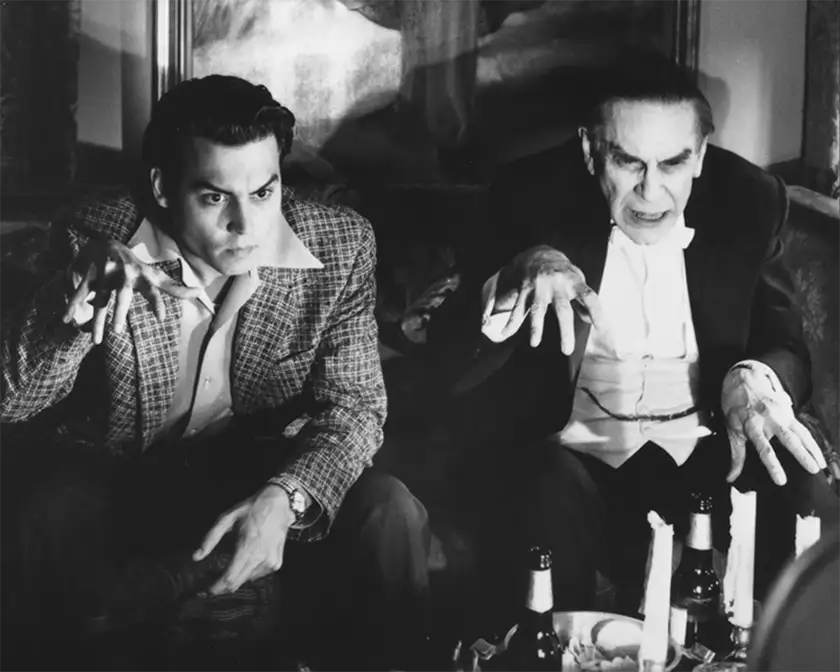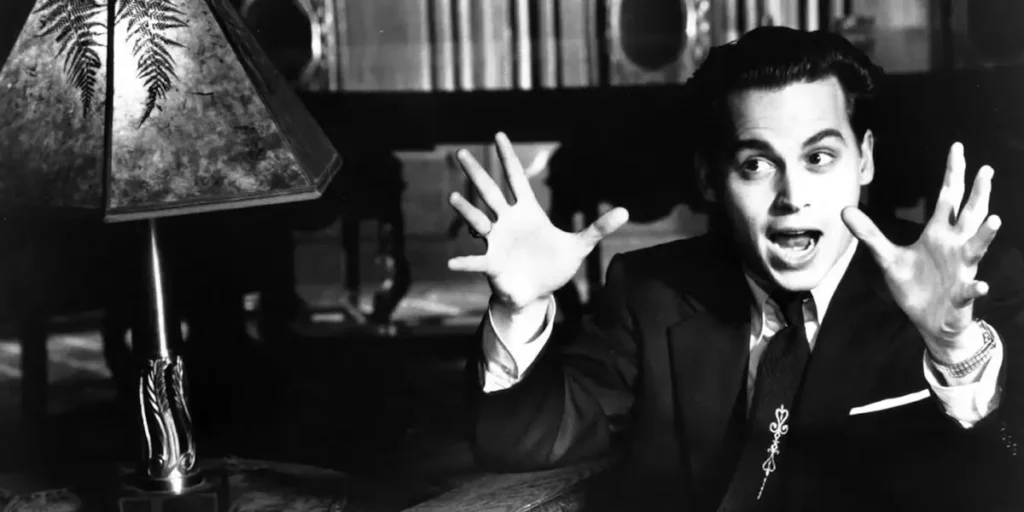Burton’s homage to his favourite filmmaker, Ed Wood, masks warmth, admiration and prescient life lessons in the guise of a standard biopic.
Edward D. Wood Jr. (1924 – 1978) is known to cinephiles as one of the worst directors to ever sit behind a camera. His repertoire of low-budget camp drama has earned him cult status among fans. The infamous likes of Plan 9 From Outer Space (1957) and Glen or Glenda (1953) are still watched with equal measures of derision and admiration to this day. Wood had a real passion for filmmaking, but none of the ability, yet he never let that stop him. 1994’s Ed Wood can’t be a tribute to his talent (since he didn’t have any), but it does commemorate his optimism. The story is unabashedly told from Wood’s point of view, and thus is suffused with his energy and enthusiasm. 30 years on from its release, its positive outlook on the world seems more relevant than ever.
This comes to us from another readily identifiable director, Tim Burton. An avowed fan of Wood’s films, Burton was signed on to produce Ed Wood before becoming director (after original choice Michael Lehmann had to pull out). Even leaving aside his admiration, Ed Wood fits nicely into Burton’s oeuvre of well-meaning eccentrics. From Pee-Wee Herman to Bruce Wayne to Edward Scissorhands, Burton’s protagonists often live outside society’s norms. Ed Wood flouts some unwritten rules, but part of the joy of Ed Wood is that he has made a life that works for him, regardless of what others think. Despite his unorthodox filmmaking methods and wardrobe, he has a girlfriend and a circle of friends who encourage his creative endeavours.
There is much about Ed Wood that defines it primarily as a Tim Burton film, but the genesis of the project lay with two men. Screenwriters Scott Alexander and Larry Karaszewski sought to emerge from their niche as writers of kids’ flicks (Problem Child, anyone?) with a memorable adaptation of the Wood biography “Nightmare of Ecstasy” by Rudolph Grey. They described the tone and focus of Ed Wood as an ‘anti-biopic’, and the term would be the foundation for their oeuvre as writers thereafter (Man On The Moon, The People vs. Larry Flynt). Their subversion of biopic tropes can be seen in the earnestness of Ed Wood’s dialogue. It often sounds like 1950s melodrama, but in doing so it guards the spirit of the films of the period and captures Wood’s well-intentioned intensity.
Over the course of his life, Wood encountered and worked with all manner of outcasts and ne’er-do-wells, but he embraced them all with a consistent optimism. The film doesn’t shy away from the darkness in the lives of Wood’s friends and colleagues, but Wood himself is always moving forward with his filmic visions. He is forever looking for the next step in getting his films made and is willing to cosy up to any half-willing financier to get the job done. As much as Burton might see Wood as a kindred spirit, many filmmakers will see Ed’s struggles to get financial backing reflected in their own production problems. Indeed, financial woes might have nudged Burton on to tell Wood’s story. His previous film, Batman Returns, was not as big a box-office hit as Warner Bros. hoped, and he declined the chance to make a third film for the franchise. With free time and a newly vacant director’s chair, this was the perfect chance for Burton to honour his hero.
Ed Wood centres on the period between 1953 and 1957, when Wood made some of his most (in)famous films. This focus allows Burton and the script to showcase Wood’s best qualities (and a few of his worst too). The film opens on a wet Hollywood night as Wood (Johnny Depp) debuts his new play in a leaky theatre with hardly any tickets sold. He opts to see the positives within the negatives of the reviews, because he knows his best is yet to come. From the start, we see the ragtag bunch of characters that make up his inner circle. Alongside his devoted girlfriend Dolores (Sarah Jessica Parker), Wood fills his life with characters that flout norms in fascinatingly flamboyant fashion.
There’s wannabe transexual Bunny Breckenridge (Bill Murray, having a whale of a time camping it up), TV psychic Criswell (Jeffrey Jones), and most notably, one-time horror star Bela Lugosi (Martin Landau). Wood befriends Lugosi out of admiration, but the two end up complimenting each other out of a weird necessity. Wood needs some kind of star power for his next movie to get funding, and Lugosi needs the money. As we learn later, the Hollywood system has not been kind to Lugosi since his heyday in Dracula.
In this mix of characters, Burton returns to a familiar theme. In films before and since, he’s shown a fascination with family, both biological and found. Ed Wood is an exemplar of this theme in his films. Ed may have filled his life with some strange characters, but he never judges them, and they never judge him in return. He’s drawn to the imposing bulk of wrestler Tor Johnson (played by real wrestler George ‘The Animal Steele’) or the goth-tinged frostiness of TV hostess Vampira (Lisa Marie) because he knows they’ll be memorable in his films, but they warm to Ed in turn for seeing them as something more than the fronts they put forward for their respective audiences.
Such friendships allow Ed to embrace his own peccadilloes, including his fondness for wearing women’s clothing. Even when his relationship with Dolores turns sour and ends, Ed is still loyal to the friends he has drawn to his side. When Ed starts a relationship with Patricia Arquette’s sweet Kathy, he opts to be honest with her about his transvestism, and she accepts him because of his honesty. Whether looking at his friends or his films, Ed Wood is a lesson in not judging the book by the cover. Even today, as debates go on about the place of people of all genders and sexualities, Ed Wood reminds us that compassion should inform our interactions above all else.
Burton works alongside numerous close friends on Ed Wood, and frequent collaborator Depp shines in the title role. Ed is easily one of the brightest and chirpiest character’s on Depp’s CV, and it works because he understands the register for which Burton is aiming. Ed is unrepentantly earnest in his pursuit of his visions, and never lets rejection foil him. Depp is always wide-eyed and charming, with his refreshingly positive performance proving a visible contrast to the darker likes of Edward Scissorhands or Captain Jack Sparrow.

Yet even he can’t help having scenes stolen out from under him by Landau’s superlative turn as Lugosi. Aided by truly transformative make-up by Rick Baker and Ve Neill, Landau resurrects Lugosi with a pitch-perfect Hungarian accent and seductive presence, before adding deep layers of poignancy, as Ed and the audience watch him descend into heroin addiction and bankruptcy. Lugosi was the first major star to check into rehab for an addiction, and Burton showcases both the sad lot that Lugosi’s life had become by this point, and the friendship with Wood that helped him through the worst of it. Both Landau and the makeup team won well-earned Academy Awards for their efforts.
For all the enthusiasm Wood had for his work, Ed Wood isn’t naive about just how poor and shoddily made his film are. More than a few moments see Ed get hit by misguided inspiration when his films aren’t working. Needing a double for Lugosi in Plan 9 From Outer Space, he runs into Kathy’s chiropractor (Ned Bellamy), and decides he looks sufficiently like Lugosi to work. However, the resemblance is only from the nose up, so the good doctor has to cover his face.
The final act of the film, centered on the making of Plan 9, revels in the simple tricks Wood employed to bring his vision to life. Never mind that he practically defrauded a church to raise the funds for it, or that he rarely did more than one take; we’ve all heard about Plan 9, and its reputation has outlived all who made it. Ironically, unlike the films it’s homaging, Ed Wood looks and sounds sumptuous. Stefan Czapsky’s black-and-white camerawork and Howard Shore’s theremin and bongo-heavy score evoke the 1950s (and films of the period) vividly. One can imagine the production design team having a challenging but fun time recreating Wood’s painfully cheap sets and props.
Ed Wood is a film of ironies. It champions the power of, and passion for, filmmaking by exploring it through the eyes of one of the worst filmmakers to have ever made a motion picture. Burton uses some truly terrible films to inspire what may be his best work. Edward D. Wood Jr. was a bad director, but a good man, and Burton makes sure both these facts are known by the time the credits roll. Ed Wood transcends its biopic tag to become a film about pursuing passions, regardless of what the rest of the world might say. Frankly, more films could do with that message.
Ed Wood is now available to watch on digital and on demand.

